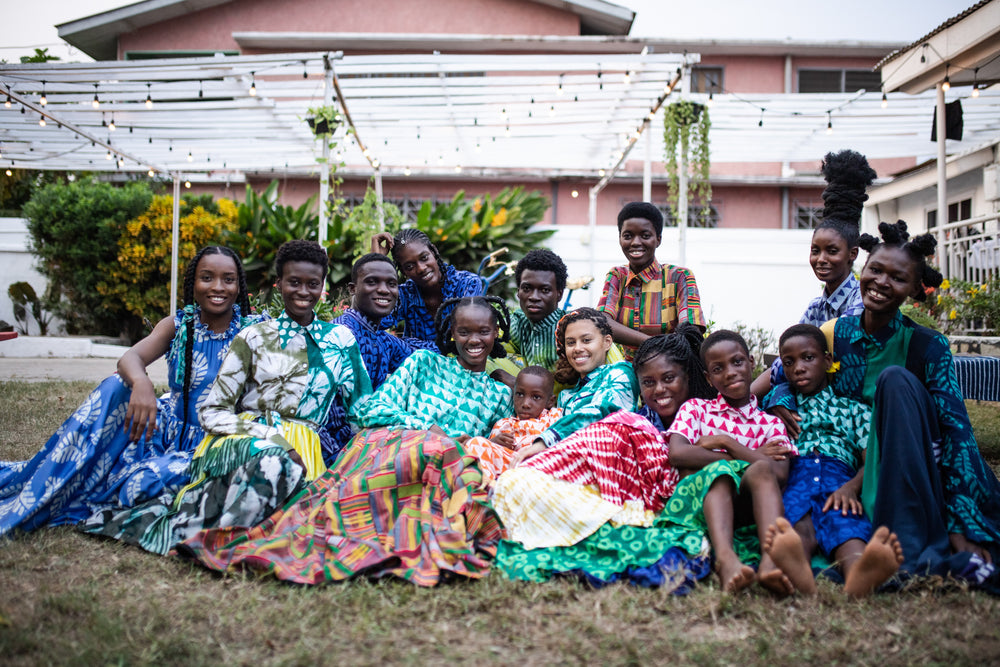TAKE PART: Africa's Set to Become a Fashion Powerhouse, and Rosario Dawson Is Helping It Happen

The actor's project, Studio One Eighty Nine, provides a platform for the continent's artisans to shine.
Thanks to Miranda Priestly's infamous Devil Wears Prada lesson, we know that the world's most recent obsession with the color cerulean began, as Priestly put it, when "Oscar de la Renta did a collection of cerulean gowns." Then it trickled down to the average person from the runways of Paris, New York, and Milan.
But given that seven out of 10 of the fastest-growing economies in the world are in Africa, in another generation, designers in Accra, Brazzaville, and Cape Town might be the places setting fashion trends. Creative projects like Rosario Dawson and Abrima Erwiah’s Studio One Eighty Nine hope to catalyze that transformation.
Indeed, the platform, which Dawson and Erwiah launched in 2012, helps creatives in Africa—from designers and photographers to foodies and activists—promote their wares. Think of it as Pinterest meets Etsy. In conjunction with the platform, they've also launched a line called Fashion Rising that directly employs Africans, trains them through pop-up fashion schools, and provides the kind of market feedback they need to dominate the fashion scene.
Despite the abundance of talent in Africa, artisans there aren't able to easily sell goods across the globe. "For some reason, something made in Africa doesn't hold the same weight as something made in Italy," Dawson says. That doesn't make sense, considering the same handcrafted care and skill you'd see put into making clothing and accessories in Italy is found in Africa.
"You can see it in all of the different brands that go down to Africa and say, 'We're going to do a Masai collection, or we're going to do the Africa-inspired collection,' " says Dawson. When you buy an African-inspired piece, you're buying a garment that's probably made in a Chinese factory before being sold by a European fashion label. "It was inspired by Africa, but it wasn't made there, and it doesn't benefit [Africa]. And that doesn't make any sense," says Dawson.
Investing in a model in which goods are designed and manufactured in a nation such as Congo is a smart economic move. In England alone the fashion industry is worth £26 billion and is nearly 3 percent of the GDP. What if Congo could be transformed in the same way? Given the economic growth across the continent, Dawson says it just makes sense to encourage young Africans to have careers in fashion and pursue their dreams.
Providing young men and women with the ability to pursue their dreams is a thread that carries through all of Dawson’s work. "Some people think I only do women's issues because I'm on the board of V-Day," a global movement to end violence against women. "Or they say, 'You're only doing voting stuff but only with Latinos.' "
Dawson points out that, yes, she talks about Latino Millennials, "but I talked about Millennials in general, including the fact that two-thirds of the world’s youth population will be in Africa by the year 2100. That's something to pay attention to."
Dawson is also a proud New Yorker whose Puerto Rican, Afro-Cuban, Irish, and Native American roots reflect the globe. She's known Erwiah since they were both teenagers with dreams of their own. In 2011 they took a trip to Congo for the opening of City of Joy, a transformational leadership community started by V-Day for women who've been impacted by rape and abuse.
Getting to Congo was an ordeal of thunderstorms and canceled flights, but once there, they saw women who'd been through horrific trauma because of the civil war "dancing, and they've designed the space, and they've had so much input into how the program would work." They'd been "given yeses when they’ve been told no their whole lives," says Dawson.
Inspired, Dawson and Erwiah began thinking about how they could combine their backgrounds—Dawson in media and Erwiah in luxury—and resources to partner with people who've seen diplomats and politicians come and go but haven't seen real change. That led to Studio One Eighty Nine and Fashion Rising.
To produce the first collection, they worked with designers in Liberia, Uganda, Kenya, and Ghana, focusing on wax prints. Their next line works primarily with South African designers and focuses more on batiking. The pieces are made to be mixed and matched and are, says Dawson, priced fairly. "It's not charity. You're not going to haggle down the price."
You can open your closet and see a scarf from Japan, a pair of shoes from Korea, and a blouse from France. Why not gorgeous, handmade luxury goods made in Africa? "We are really trying to appeal to the world citizen," says Dawson. "I don't have those ideas or weird mythologies about Africa. I know Africa is not a country. I get that, and there’s a lot of us who do."
We're living in a time when "we have the ability to communicate with each other and share with each other, and it's not just about being a woman or being of a certain age or being of a certain color," says Dawson. Projects like Studio One Eighty Nine and Fashion Rising have the potential to help us, she adds, "really see that we are not so disconnected or dissimilar after all."
March 19, 2014




